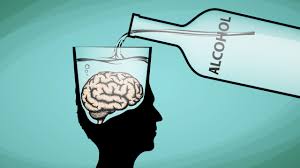Alcohol is a widely consumed beverage that is enjoyed by people all over the world. It is often used as a social lubricant, a means of relaxation, or a way to unwind after a long day.
However, despite its popularity, it is important to understand the effects of alcohol on the body, particularly when consumed in excess. In this article, we will explore the impact of alcohol on health and wellness, and discuss the ways in which alcohol can negatively affect the body.
The immediate effects of alcohol on the body are well-known. When consumed, alcohol enters the bloodstream and quickly travels to the brain, causing a range of effects. These can include impaired judgment and coordination, slurred speech, and slowed reaction times. These effects can be particularly dangerous when driving or operating machinery, and can put individuals at risk of accidents and injuries.
However, the impact of alcohol on the body goes beyond these immediate effects. Over time, excessive alcohol consumption can cause a range of health problems and have a negative impact on overall health and wellness.

One of the most significant impacts of alcohol on the body is liver damage. The liver is responsible for filtering toxins from the bloodstream, and when alcohol is consumed, it is the liver’s job to break it down and eliminate it from the body. However, when the liver is exposed to excessive amounts of alcohol, it can become damaged and inflamed. Over time, this damage can lead to a condition called cirrhosis, in which the liver is scarred and permanently damaged.
This can have a range of serious health consequences, including liver failure and even death.
Effects of Alcohol on the body
In addition to liver damage, excessive alcohol consumption can also lead to a range of other health problems. These can include high blood pressure, heart disease, and an increased risk of certain types of cancer. Alcohol can also weaken the immune system, making individuals more susceptible to infections and illnesses.
Mental health is another area in which alcohol can have a significant impact. While many people use alcohol as a means of coping with stress or anxiety, the reality is that excessive alcohol consumption can actually exacerbate these issues. Over time, alcohol can disrupt the delicate balance of neurotransmitters in the brain, leading to depression and anxiety. In addition, alcohol can also interfere with sleep, leading to insomnia and other sleep disorders.
It is also important to note that the impact of alcohol on the body can vary depending on a range of factors, including age, gender, and genetics. Women, for example, are generally more susceptible to the negative effects of alcohol than men, as they tend to have lower levels of the enzyme responsible for breaking down alcohol in the liver. Similarly, older individuals may be more susceptible to the negative effects of alcohol, as the liver’s ability to process alcohol decreases with age.
Despite the many negative effects of alcohol on the body, it is important to note that moderate alcohol consumption has been linked to a range of health benefits. For example, research has shown that moderate alcohol consumption can reduce the risk of heart disease and stroke, as well as improve cognitive function and lower the risk of developing certain types of dementia. However, it is important to note that these benefits only apply to moderate alcohol consumption, which is generally defined as one drink per day for women and two drinks per day for men. Excessive alcohol consumption can negate these benefits and have a range of negative impacts on health and wellness.
So, what can individuals do to minimize the negative effects of alcohol on the body? The most obvious answer is to drink in moderation or to abstain from alcohol altogether. However, for those who do choose to drink, there are a few steps that can be taken to minimize the negative effects of alcohol on the body.

Firstly, it is important to eat a balanced meal before drinking, as this can help slow the absorption of alcohol into the bloodstream. Drinking water between alcoholic beverages can also help to slow the absorption of alcohol, as well as prevent dehydration.
In addition, it is important to be aware of how much alcohol is being consumed, and to set limits in advance. Keeping track of the number of drinks consumed and sticking to a pre-determined limit can help to prevent excessive drinking and minimize the negative effects of alcohol on the body.
Finally, it is important to seek help if alcohol consumption is becoming a problem. Alcohol addiction can have a serious impact on health and wellness, and can lead to a range of negative consequences. Seeking help from a healthcare professional or support group can be an important step towards recovery and can help minimize the negative effects of alcohol on the body.
Conclusion
While alcohol can be an enjoyable and social beverage, it is important to understand the impact of alcohol on the body, particularly when consumed in excess. Excessive alcohol consumption can lead to a range of health problems, including liver damage, high blood pressure, and an increased risk of certain types of cancer. In addition, alcohol can also have a negative impact on mental health and overall wellness. By drinking in moderation, eating a balanced meal before drinking, and seeking help if alcohol consumption is becoming a problem, individuals can minimize the negative effects of alcohol on the body and maintain a healthy and balanced lifestyle.
Furthermore, it is important to note that alcohol consumption can also have an impact on social and emotional wellbeing. While many people use alcohol as a means of socializing and bonding with others, excessive alcohol consumption can actually have the opposite effect. Drinking in excess can lead to poor decision-making, impaired judgment, and a range of negative behaviors. This can lead to strained relationships and social isolation, which can have a significant impact on overall wellbeing.
In addition, alcohol consumption can also have financial and legal implications. Excessive alcohol consumption can lead to poor financial decisions, such as overspending or missing work due to hangovers or other negative effects of alcohol. It can also lead to legal problems, such as driving under the influence or engaging in other illegal activities while under the influence of alcohol.
Given the many negative impacts of alcohol consumption on health, wellbeing, and overall quality of life, it is important for individuals to be mindful of their alcohol consumption and to make responsible choices when it comes to drinking. This may involve setting limits, seeking support for alcohol addiction, and engaging in other healthy activities and behaviors that promote overall wellness.



















